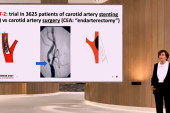Good Real-World Outcomes Seen With Next-Generation Carotid Stent
Success for Europeans could be good news for US operators looking for CMS to ease CAS restrictions, says Peter Schneider.

LEIPZIG, Germany—A next-generation micromesh carotid artery stent performs equally well in women and men, with outcomes unaffected when predilatation is used, according to two new subanalyses from the Pan-European Roadsaver experience.
Unlike conventional single-layer devices for carotid artery stenting (CAS), dual-layer micromesh options like Roadsaver (Terumo) are intended to improve lesion coverage and prevent plaque prolapse through the stent struts.
“What we saw is that we have a very low major adverse event rate in the real world in a patient setting with elective CAS,” said Arne Schwindt, MD (St. Franziskus Hospital Münster, Dortmund, Germany), presenting the sex-based subanalysis here at LINC 2023.
At 30 days, there was no difference in the primary endpoint of major adverse events (cumulative incidence of any death or stroke up to 30 days postprocedure), with rates of 2.0% in men and 2.6% in women (P = 0.44).
In the predilatation subanalysis presented by Ralf Langhoff, MD (Vascular Centre Berlin St. Gertrauden Medical Centre, Germany), most cases required no predilatation—which has been shown to increase the risk of cerebrovascular events during and after CAS—but those that did were not associated with more adverse events than cases where it wasn’t used (P = 0.29). Nor was there a difference in the incidence of stroke (P = 0.84).
Enrolling patients from 13 European countries, the ROADSAVER study includes asymptomatic or symptomatic carotid stenosis patients (mean age 71 years; 30% female) who are eligible for an elective stenting procedure. While baseline characteristics between the 1,383 men and 582 women were primarily similar, a higher percentage of men had a smoking history as well as prior MI and peripheral vascular disease. Additionally, carotid lesion lengths were slightly longer in men and target vessel tortuosity slightly more common in women. Distal filter was the most common type of embolic protection but was used more often in women than in men (89.6% vs 86.2%; P = 0.01), while use of predilatation was more common in men (27.5% vs 21.3%; P < 0.001).
There were also no differences in any of the secondary outcomes of stroke-related or cardiac death or any stroke at 30 days, although stroke rates trended higher overall in women than in men (2.6% vs 1.6%; P = 0.14).
When adverse events did occur, the majority of them took place within 48 hours to 3 days of the procedure. Time-to-event analyses for both the primary endpoint as well as the endpoint of any stroke were not significantly different between men and women.
The other ROADSAVER subanalysis analysis included 1,460 patients who had predilatation and 504 who did not. The predilatation group had slightly more complex baseline factors than those with no predilitation, Langhoff said. These included current smokers, nontraditional aortic arches, hyperlipidemia, peripheral vascular disease, and previous amaurosis fugax (often a harbinger of impending stroke). In terms of the lesions themselves, those requiring predilitation were more often longer, had smaller mean lumen diameters, and were narrower on preprocedure ultrasound.
Compared with the dilatation group, embolic protection was used in far fewer patients in the nonpredilatation group (56.7% vs 84%; P < 0.0001). Notably, those needing predilatation had more TIAs compared with those without predilatation (2% vs 0.6%; P < 0.01).
As with the time-to-event analysis in men versus women, this one also found that any adverse events that occurred happened early after the procedure, with no differences between the dilatation or predilatation groups for either the primary endpoint or the endpoint of any stroke.
In the US, a Little Progress—Maybe
As Europeans forge ahead, gaining experience with this and other novel devices for CAS, operators in the United States are watching and wondering if they might be able to add these to their armamentarium anytime soon, said Peter A. Schneider, MD (University of California, San Francisco), who moderated the session here.
“It's interesting to see [European operators] presenting data on a thousand plus patients with relatively low perioperative stroke risk, both symptomatic and asymptomatic,” he told TCTMD. “This all tells me we'll probably have these things a couple of years down the road.”
Earlier this year, the US Centers for Medicare & Medicaid Services (CMS) took public comment from physicians and medical societies regarding requests to ease the restrictions on the use of CAS. A decision memo is expected this summer.
Under the current CMS coverage determination that has been in place for years, CAS is only indicated for use in select symptomatic and/or asymptomatic patients who have high degrees of carotid artery stenosis and who are at high risk for carotid endarterectomy (CEA).
Schneider said US trials of some newer devices are gearing up, with a US-based ROADSAVER study fully enrolled and another of a different device getting close to enrollment.
“No one knows what the FDA will do on that issue of new devices. We’ll have to see, but if one or both of those are approved, it might make a big difference in the carotid field. I think the fact that CMS is willing to reopen [this discussion] is a sign that they are essentially thinking about providing additional validation to stent-based therapies,” he said. “Things are more layered now, more nuanced, there's more numbers, so there's more to talk about.”
L.A. McKeown is a Senior Medical Journalist for TCTMD, the Section Editor of CV Team Forum, and Senior Medical…
Read Full BioSources
Schwindt A. 30-day safety outcomes of male vs female patients treated using the Roadsaver dual-layer micromesh carotid stent: Evidence from a large multicenter European study. Presented at: LINC 2023. June 6, 2023. Leipzig, Germany.
Langhoff R. 30-day safety outcomes of patients treated using the Roadsaver dual-layer micromesh carotid stent with or without predilatation: Evidence from a large multicenter European study. Presented at: LINC 2023. June 6, 2023. Leipzig, Germany.
Disclosures
- Langhoff reports consulting for Abbott Vascular, Boston Scientific, Biotronik, B. Braun, Contego Medical, Kardionet, Medtronic; and is a member of Terumo Speakers Bureau.





Comments